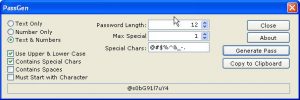A password generator is a tool for creating secure cryptic passwords. It facilitates the creation of random passwords that are highly secure and extremely difficult to break due to optional combinations.
Security experts recommend using these “strong” passwords or long passwords of random upper and lower case letters sprinkled with liberal doses of “!@#$%^&*()” characters to defend against attacks. Such passwords significantly decrease the probability that a dictionary attack program will find a match.
Some password generation programs employ unique proprietary algorithms to analyze the ability to pronounce strong passwords, thus enabling a user to create character combinations that are easier to pronounce and, as a consequence easier to memorize. This does not weaken the defense, as these passwords still remain random combinations of characters not found in any dictionary.
But even if figures and special characters are used in passwords, chances are they still are rather easy to break. The problem is that passwords created by people tend to be “reasonable”, i.e. they correspond to certain subconscious logic, which you are not aware of. For example a password starting with “p” is much more probable than the one with “k”. Also, characters on the keyboard are placed in a certain order; this also counts when you create a password. Thus a program using “smart force” method based on linguistics, psychology and ergonomics factors won’t need much more time to break a “random” human-created password than it would spend in case of a dictionary attack. This is why you wouldn’t want to use a password like “12345678” or “!@#$%^&*” in the order directly from the keyboard. In fact, most operating systems recognize these patterns and will not allow their use as passwords.
There are many different versions of password generators available from vendors for a small fee. There are also freeware password generators that allow flexibility and determine the length of password or complexity and which character sets are available. The most basic freeware may not allow special or extended characters may limit users to a smaller maximum password length. Stronger versions can allow all characters on the keyboard and can have a maximum password length of well over a hundred characters.
Here are a few examples of the different character sets that might be used depending on the version of software:
Numeric [0-9]
Alpha Lowercase [a-z]
Alpha Uppercase [A-Z]
Special Characters (!@#$%^&*-,)
Extended Characters (¢¥§©€”®)

Here is an example of a standard password generator application. After a password is generated, a selection of text can be copied to the clipboard for use in other programs or placed into a password safe program, such as KeePass or Password Agent.
KeePass and Password Agent software both include a password generation tool under the Tools menu:


DOI domain password policy:
- Password must be at least 12 characters long.
- Password cannot contain your username.
- Password cannot have been used in previous 20 passwords.
- Password cannot have been changed less than 24 hours ago.
- Password must satisfy 3 out of the following requirements:
- Contain lowercase letters (a, b, c, …, z)
- Contain uppercase letters (A, B, C, …, Z)
- Contain numbers (0, 1, 2, …, 9)
- Contain symbols (~, !, @, #, etc.)
Quicky Password Generator
QPassGen is a convenient password generator that does not require installation:

